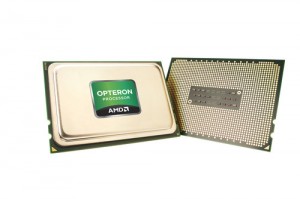 With a future in ARM servers looming, Advanced Micro Devices on Monday announced its fastest 16-core Opteron 6300 server chips as the company continues to enhance its x86 line-up.
With a future in ARM servers looming, Advanced Micro Devices on Monday announced its fastest 16-core Opteron 6300 server chips as the company continues to enhance its x86 line-up.
The five new Opteron chips, code-named Abu Dhabi, are up to 40 percent faster on enterprise application workloads than the 1-year-old Opteron 6200 chips code-named Interlagos, which also had 16 cores, said John Williams, vice president for server marketing and business development at AMD. Depending on the workload, the performance boost could be as low as 7 percent.
The Opteron 6300 chips have clock speeds ranging from 1.8GHz to 3.5GHz, and the processors will be quicker at deploying virtual machines, Williams said. AMD is “heavily engaged” with virtualization partners like Red Hat and Microsoft to improve virtualization performance, Williams said.
The chips are designed for servers running public and private clouds, and for enterprise applications such as database and analytics programs.
The new chips are for 2- and 4-socket servers. Hewlett-Packard, Dell, Cray, Silicon Graphics and others will use the processors in servers, and some system announcements are expected Monday.
AMD hopes the chips will provide a spark for its slumping server business. The company is also changing its strategy to include ARM-based servers, which it will start selling in 2014. However, AMD says x86 processors will remain a mainstay of its server business.
AMD’s goal is to mix-and-match workloads between x86 and ARM servers, with the processing cores linked through an interconnect called Freedom Fabric, which works with both architectures.
“If there is a set of racks and you’re adding in a number of racks with ARM clusters, you are likely going to run different workloads,” Williams said.
Companies such as Facebook and Google buy a lot of servers, and there is a growing interest in compact ARM servers as a power-efficient way to process requests tied to search and social networks. AMD is moving to ARM servers to gain a larger market share of such power-efficient and dense machines.
Williams conceded that servers with Abu Dhabi chips right now may not be directly compatible with ARM servers in a data center. But AMD is trying to bring the architectures closer and in the future will be able to combine both ARM and x86 in a server installation. But companies will also need to port applications to work on ARM, which could take time, Williams said.
Beyond ARM, Williams said there is a lot of momentum behind the x86 Opteron server chips. AMD’s previous Opteron 6200 chips are being used in the U.S. Department of Energy’s 20-petaflop supercomputer called at the Oak Ridge National Laboratory in Tennessee. Opteron 6300 processors are being used in a supercomputer that will be installed at Indiana University next year, the university and AMD said.
The new Opteron chips have Piledriver cores, which AMD has been putting in Trinity laptop and desktop chips. The Piledriver cores are based loosely on the older Bulldozer core, which is found in Interlagos, but the new core delivers major performance boosts, AMD has said. The Piledriver core mixes CPU, integer and floating point units to execute more operations per clock cycle while using less power.
The chips have been tweaked to deliver better Java performance, and software stacks are better prepared for Piledriver compared to its predecessor, Williams said. The Bulldozer core was considered a disappointment as lab tests revealed that chips delivered lower-than-expected performance.
Opteron 6300 chips are backward compatible, and the company decided to stick with 16 cores as it wanted “thermal” balance at the socket level, Williams said.
“If we went to 20 cores, you probably start to look at balance issues around memory” and processing capabilities, Williams said.
The new processors support the older PCI-Express 2.0, while Intel’s server chips have moved on to the faster PCI-Express 3.0. PCIe 3.0 can move data at 8 gigatransfers per second, which is a significant improvement over PCIe 2.0, which has a transfer speed of 5 gigatransfers per second. Williams said that Opteron 6300 16-core chips scale very well and PCI-Express 2.0 provides fast throughput.
The 140-watt Opteron 6386 SE has a base speed of 2.8GHz that can scale to 3.5GHz, and is priced at US$1,392 in units of 1,000. The Opteron 6380, 6378 and 6376 use 115 watts, have clock speeds of 2.3GHz to 2.5GHz that can scale to 3.2GHz and 3.4GHz, and are priced between $703 and $1,088. The Opteron 6366 HE uses 85 watts, has a base clock of 1.8GHz that can scale to 3.1GHz, and is priced at $575.
The company also announced two Opteron 6300 8-core chips priced starting at $293, and a quad-core chip starting at $501.





